me too! Fact: when a person has a seisure, they may start to go number one or two.
What to Do in 9 Extreme Situations When You Need to Act Fast
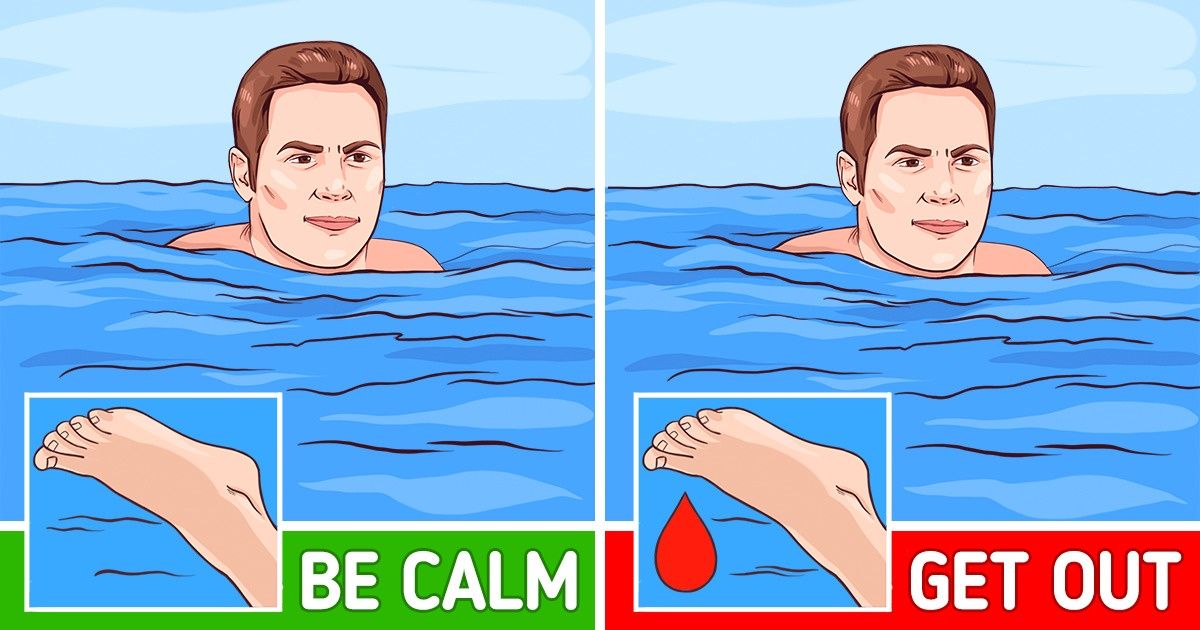
There have been so many movies over the course of history that show humans getting confronted by unprecedented situations. Whether it’s natural disasters or wild animal attacks, humans always seem to find the solution. However, in real life, things can get a bit trickier and may require you to react way faster than actors do in movies. Learning some essential survival skills will help you confront any possible danger that threatens you or those around you.
Bright Side would like to offer some crucial advice that will help you react properly when faced with extremely difficult issues.
9. If you are home during an intruder invasion
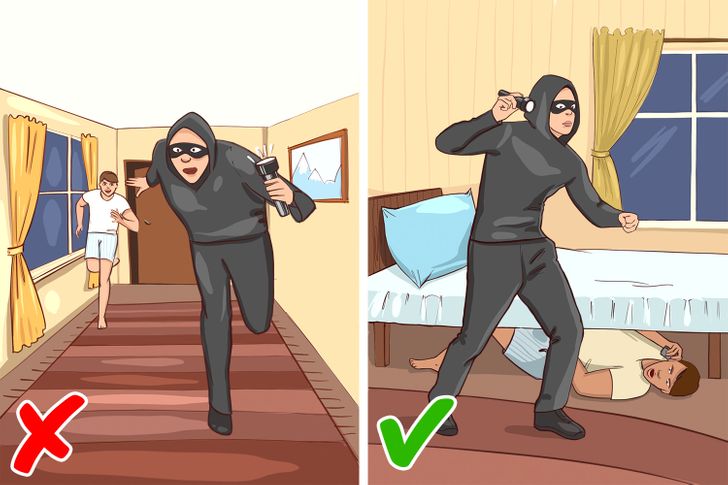
- Avoid: Most burglars will run away if they realize that someone is home. If that happens, you don’t need to play the hero and run after them. Also, when you hear that first alarming noise, don’t start searching your property to see where it came from.
- Do instead: Stay calm and make sure that someone has actually entered your home by listening. Quickly search your surroundings and see if you can escape. If not, then find a good hiding spot and call the police immediately. Stay as quiet as you can and follow their instructions.
If you can see the intruder from where you are, try and memorize as much as you can about them. General characteristics, like height, weight, gender, and clothing will help the police in identifying them.
8. If you go skydiving and your parachute malfunctions
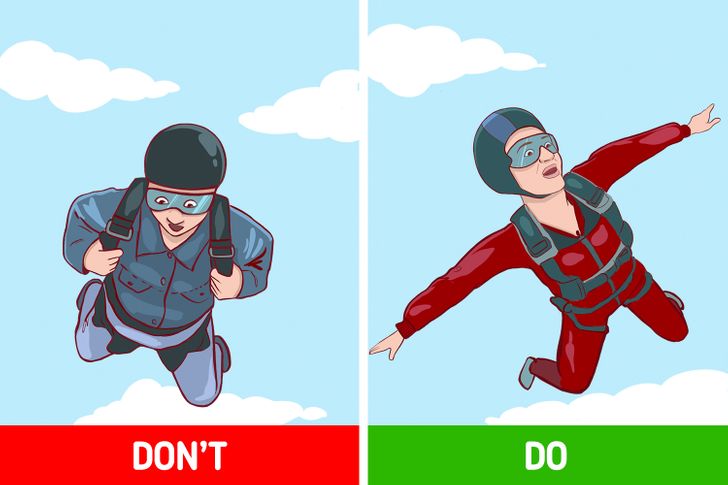
- Avoid: A Swedish professor says that falling with your head facing down increases your speed to 420-430 km/h (260 m/h). So, not only will you reach the ground sooner, but your possibilities of survival are slim to none.
- Do instead: First, you need to stay as calm as possible. Then, you need to stretch out your entire body, something that will keep your falling speed around 200 km/h (124 m/h). If you can see a soft landing spot, try and direct your body toward it. The last step would be to re-direct your body when you are close to the ground so that you land on your feet.
7. If you are caught in a flood.
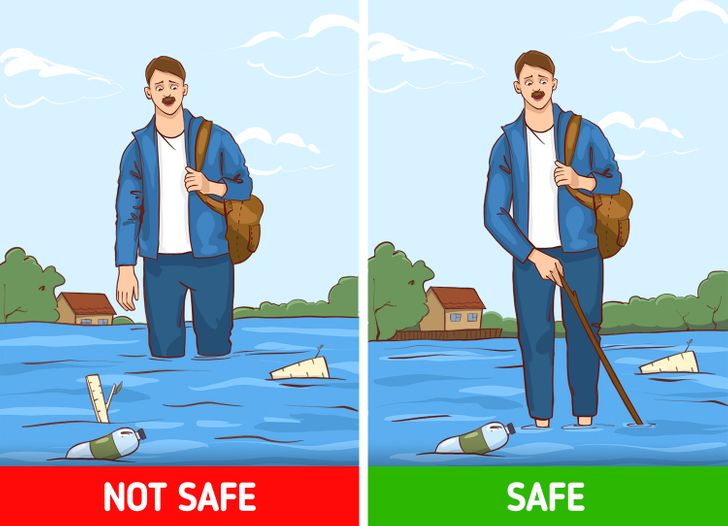
- Avoid: Do not walk through moving water that is 6+ inches deep. More specifically, if the stream is above your ankles, stop walking in that direction. The stream could overpower you even if you feel like you can handle it. Also, if you are near electrical cords, don’t make the mistake of touching them — especially if your hands are wet.
- Do instead: Turn off the electricity supply and pull all the plugs out. If you are outside your home, use a stick to walk through water, since it will help you figure out how firm the ground is. If you stumble upon a flowing stream that is well above your ankles, turn around immediately. The biggest mistake you could make is underestimating the water’s power.
6. If you are caught in a blizzard out in the wild
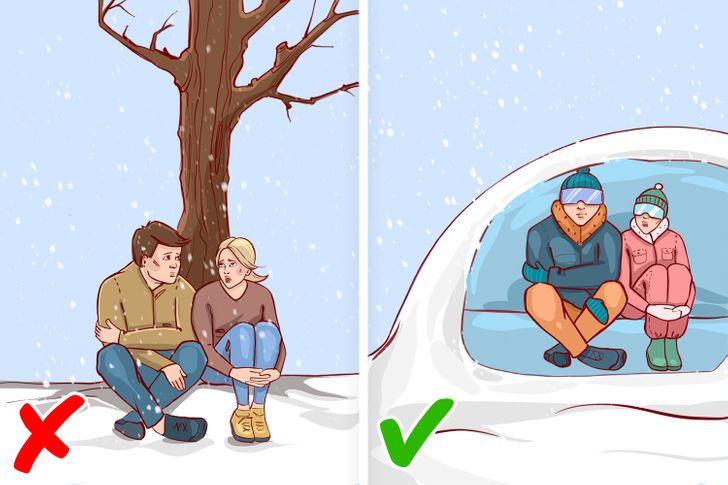
- Avoid: First thing you need to remember is that eating snow can be very dangerous. It can lower your body temperature and cause hypothermia. Also, dressing lightly can pose a serious health threat. If, on the other hand, you are in your car, turn the engine off and don’t leave it no matter what until the blizzard has finished.
- Do instead: You need to be dressed properly whenever you go to a location with too much snow. If a blizzard happens, try to find a drift or a slope and build a snow cave that is at least 6 feet deep. You also need to carry a fire kit with you that you will use once you are in your cave. This way not only will you stay warm, but rescuers will be able to find you faster.
5. If a volcano erupts near your location
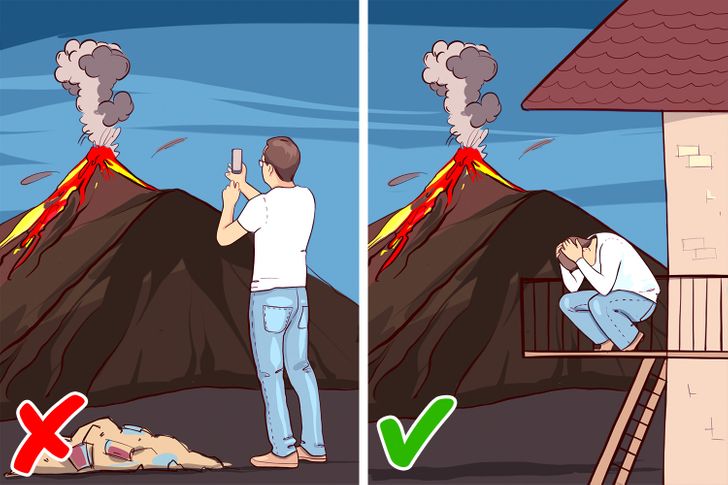
- Avoid: Keeping your windows and shutters open might give you a nice view, but the volcanic ash can do extreme damage to your lungs. If you happen to be outside, do not stay out in low-lying areas that are completely open. Debris and lava can find you a lot easier this way.
- Do instead: Close all windows and shutters and wear long-sleeved shirts and pants. If you are outside, find high ground and protect yourself from the flying debris. Wear a face cloth and goggles to keep your eyes and airways safe. After the eruption has finished, go up to your roof and clean the ashes off of it, since they can cause it to collapse from the extreme weight.
4. If a hippo starts chasing you
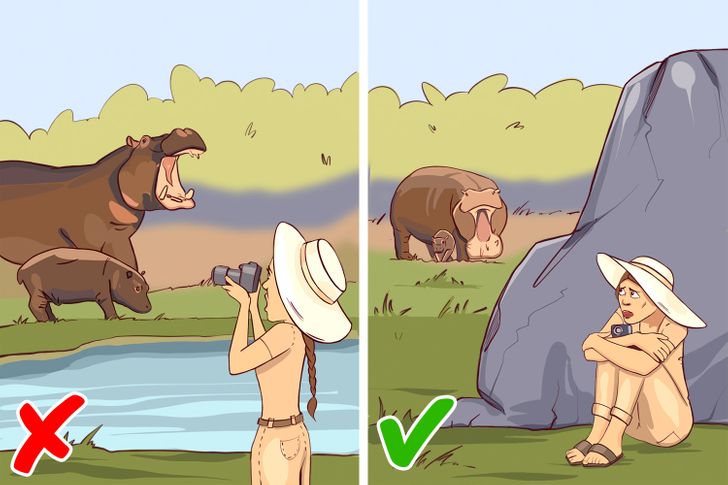
- Avoid: If you see a hippo at a close distance, don’t think about sneaking up on it, since they don’t like being surprised. Shallow water should be avoided since this is where hippos are strong and can use their big bodies to attack you. Also, mating season should be a big “no,” since males are very aggressive around this time.
Females will get very angry and annoyed if you try to get near them and their babies. If you ever see a hippo yawning, don’t think that they are sleepy, they are probably preparing for an attack. - Do instead: If a hippo flashes its teeth at you, start running immediately. Try to find cover, like a tree or a rock, since it is impossible to outrun them. You can try running in a zigzag, since their big bodies don’t allow them to change directions very quickly. On the other hand, if you are in the water start swimming in the opposite direction from where you saw the hippos.
3. If someone next to you is having a seizure
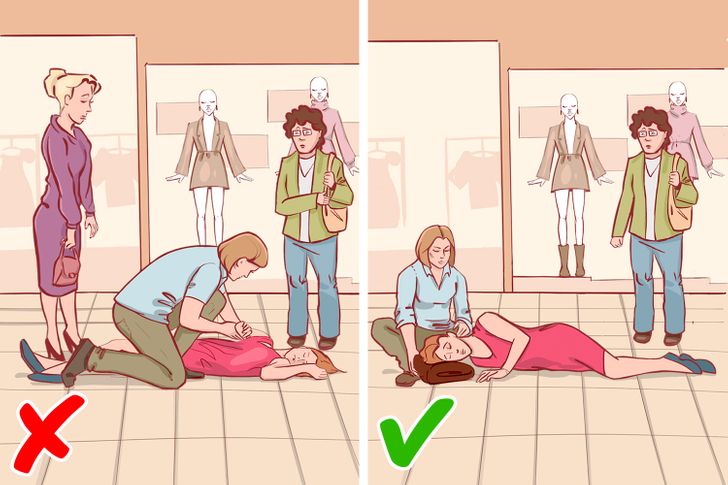
- Avoid: Don’t try to keep the person lying down or even worse try to control their body movements. Also, don’t give them anything to eat or drink, since food can injure their teeth or jaw. Remember that someone having a seizure can’t swallow their tongue. You can also forget about giving that person CPR, since their breathing will go back to normal by itself.
- Do instead: Make sure that not many people are standing over the person. Place them on their side so they can breathe easier and make sure there aren’t any blunt objects lying around. If the person is wearing glasses or a tie, calmly remove them. You can put a jacket or something soft under their head so they don’t injure themselves.
2. If someone tries to hijack your car
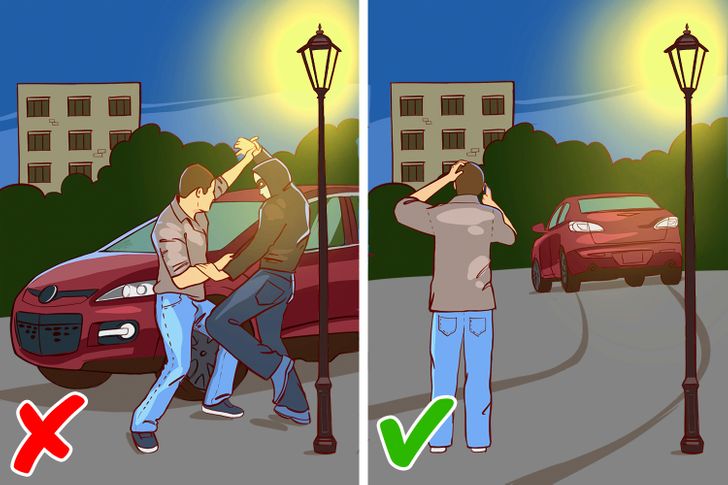
- Avoid: Most car jackings happen when someone is inside their car, so get off your phone and pay attention to your surroundings. Don’t park on poorly lit streets where someone can attack you when entering or exiting your car. Don’t keep your door open for too long and definitely don’t open the windows before you turn the engine on. Also, if someone bumps you from behind, don’t get out if it’s dark outside, but wait until you get to a well-lit and busy area.
- Do instead: If you are stopped at a red light, make sure that you can see the tires of the car in front of you. This means that there is enough space for you to storm off in case someone tries to steal your car. If there is nothing you can do, just give them your car, and let them leave. And if your kids are in the car with you, make sure to get them out first.
1. If you’re swimming near piranhas

- Avoid: The first rule is to never enter a piranha-infested river if you have open wounds. Another important thing to remember is that you shouldn’t thrash around in the water, since you will only attract unwanted company. If you happen to be in an Amazonian river during a dry season (June to December), just avoid the water altogether. The traditional food sources of piranhas will be exhausted and they will, therefore, turn to other options in order to survive.
- Do instead: If a piranha does bite you, it is probably a one-bite incident, but this can attract many others because of the blood. That’s why, if you are bleeding, you should rush out of the water as fast as you can. If there are others swimming near you, let them know that they might be in danger too.
Then, you should seek medical help for your bite. The bacteria that can usually be found in tropical rivers are just as dangerous as the piranha bite.
Have you ever faced any of the above situations? What was your instinctive reaction and how did it help you get out of trouble?
Comments
If I knew there are piranhas in water, I would not dare to swim there :p
the malfunctioning of parachute is my fear, and because of this I don't want to try it
even though it's probably the experience of life
Related Reads
My Husband Blamed Me for My Period on Our Honeymoon, So I Turned the Tables

I Refuse to Give My Inheritance to My Stepson—I’m Not His Personal Bank

I Chose to Be Childfree, but Suddenly Became a Mom—And Now I’m Trapped
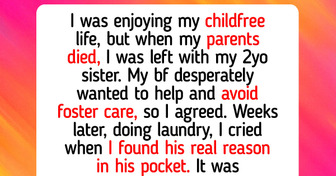
I Refuse to Let My Adoptive Parents Decide My Future in Silence

18 Seniors Whose Sharp Wit Proves Humor Only Gets Better With Age

I Refused to Let My Stepmother Dictate My Wedding—I Have Been Too Kind

I Refuse to Watch My Teenage Daughter Give Her Entire Salary to Her Boyfriend

12 Stories That Prove a Quiet Kindness Can Make the Loudest Difference

12 Heartwarming Moments That Show How Family Kindness Saves Lives

I Was the Invisible Child for Years, So I Made Them Regret Ignoring Me

18 Stories About Exes Who Proved Harder to Forget Than to Leave
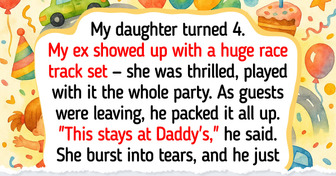
I Refused to Expose My Salary to My Parents, Now My Life Is Falling Apart
